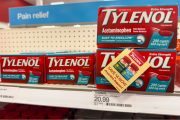The Food and Drug Administration (FDA) has reversed course on its Emergency Use Authorization (EUA) for hydroxychloroquine for the treatment of COVID-19.
In a letter discussing the revocation of the EUA for the drug, FDA chief scientist Denise Hinton said the agency no longer found the drug likely to be effective in treating COVID-19.
“We now believe that the suggested dosing regimens for CQ and HCQ as detailed in the Fact Sheets are unlikely to produce an antiviral effect,” Hinton said in the letter. “Earlier observations of decreased viral shedding with HCQ or CQ treatment have not been consistently replicated and recent data from a randomized controlled trial assessing probability of negative conversion showed no difference between HCQ and standard of care alone,” she continued.
As a result, the agency concluded, Hinton wrote, that “it is no longer reasonable to believe that oral formulations of HCQ and CQ may be effective in treating COVID-19, nor is it reasonable to believe that the known and potential benefits of these products outweigh their known and potential risks. Accordingly, FDA revokes the EUA for emergency use of HCQ and CQ to treat COVID-19.”
Hinton’s letter was written in response to a missive from Gary L. Disbrow, deputy assistant secretary and director of medical countermeasure programs for, and now acting director of, the Biomedical Advanced Research and Development Authority (BARDA), a miscellaneous alphabet-soup agency deeply embedded in the giant bureaucracy of the Department of Health and Human Services (HHS).
Disbrow took over leadership of BARDA from his former boss, Rick Bright, an anti-Trumper who had noted delusions of grandeur, believing himself to be the chief technocrat who would bring COVID-19 to heel.
“My professional background has prepared me for a moment like this — to confront and defeat a deadly virus that threatens Americans and people around the globe,” Bright said in a self-congratulatory statement following his ouster from BARDA. In the same statement he touted his personal efforts to stop the use of hydroxychloroquine. “I limited the broad use of chloroquine and hydroxychloroquine, promoted by the administration as a panacea, but which clearly lack scientific merit,” he said.
That hydroxychloroquine use to fight COVID-19 infection lacks merit, as Bright and now the FDA claims, is a dubious assertion. Notably missing from the FDA’s statement pulling its EUA is the fact that treatment protocols using the drug for COVID-19 have relied on hydroxychloroquine being part of a multi-drug treatment being provided early in the course of a SARS-CoV-2 infection.
There have been several studies that suggest hydroxychloroquine may have a role in treating COVID-19.
An early study on the potential of hydroxychloroquine published in the International Journal of Antimicrobial Agents and made available online on March 20 concluded, “Hydroxychloroquine treatment is significantly associated with viral load reduction/disappearance in COVID-19 patients.” The study also noted, “Our preliminary results also suggest a synergistic effect of the combination of hydroxychloroquine and azithromycin. Azithromycin has been shown to be active in vitro against Zika and Ebola viruses and to prevent severe respiratory tract infections when administrated to patients suffering viral infection.”
While this study was small and far from definitive, earlier work found that chloroquine had an in vitro effect on SARS-CoV-2. In work published in the journal Cell Research, Chinese researchers affiliated with the State Key Laboratory of Virology associated with the Wuhan Institute of Virology and with the Beijing Institute of Pharmacology and Toxicology reported:
Chloroquine is known to block virus infection by increasing endosomal pH required for virus/cell fusion, as well as interfering with the glycosylation of cellular receptors of SARS-CoV. Our time-of-addition assay demonstrated that chloroquine functioned at both entry, and at post-entry stages of the 2019-nCoV infection in Vero E6 cells. Besides its antiviral activity, chloroquine has an immune-modulating activity, which may synergistically enhance its antiviral effect in vivo. Chloroquine is widely distributed in the whole body, including lung, after oral administration. The EC90 value of chloroquine against the 2019-nCoV in Vero E6 cells was 6.90 μM, which can be clinically achievable as demonstrated in the plasma of rheumatoid arthritis patients who received 500 mg administration. Chloroquine is a cheap and a safe drug that has been used for more than 70 years and, therefore, it is potentially clinically applicable against the 2019-nCoV.
Another small study from Chinese researchers, this time affiliated with Renmin Hospital of Wuhan University, found that hydroxychloroquine may have improved patient outcomes for those stricken with COVID-19. Posted to the medRxiv preprint archive on March 30, this research team found:
The data in this study revealed that after 5 days of HCQ treatment, the symptoms of patients with COVID-19 were significantly relieved, manifesting as [shortened] recovery time for cough and fever. At the same time, a larger proportion of patients with pulmonary [inflammation] has been partially absorbed in the HCQ treatment group, indicating the immune modulation and anti-inflammatory properties of HCQ in non-malarial diseases. At present, the multiple actions of HCQ such as regulation in pro-inflammatory cytokines [e.g. Tumor necrosis factor- (TNF- ), interleukin-1 (IL-1), interleukin-1 (IL-6)], antioxidant activities, also promote [its use in treating] rheumatic diseases such as SLE. According to current research, a higher pro-inflammatory cytokine storm existed in COVID-19 patients with a severe or critical illness, [which] eventually affected the prognosis. For this, IL-6 antibody blocker, transfusion of convalescent plasma, and other therapies have been applied to counteract the cytokine storm. Therefore, with antiviral and autoimmune regulation effects, HCQ should be a protector in SARS-CoV-2 infection.
Despite this, these researchers cautioned that hydroxychloroquine could have side effects to watch for. “Although HCQ has proven to be effective, with advantages of [being] inexpensive and easily accessible, its potential detrimental effects in viral diseases must also be taken seriously,” they wrote. “Retinopathy is one of the major adverse reactions of long-term therapy with HCQ. Besides, patients with rheumatoid diseases treated with HCQ occasionally experience arrhythmias. Other rare adverse reactions caused by HCQ include gastrointestinal reactions, cramps, liver dysfunction, itching, headache, dizziness, insomnia, [and] peripheral neuropathy. Fortunately, deciding on individual treatment plans scientifically, monitoring adverse reactions timely, to avoid overdose, short-term application of HCQ is relatively safe.”
These are a few preliminary studies that illustrate that there may be a role for hydroxychloroquine in treating COVID-19. These studies are not definitive, however, and other studies are needed. Still, writing in the American Journal of Epidemiology, Harvey A. Risch, professor of epidemiology at the Yale School of Public Health and Yale School of Medicine, argued in favor of early treatment of COVID-19 with a combination of hydroxychloroquine and azithromycin.
“Five studies, including two controlled clinical trials, have demonstrated significant major outpatient treatment efficacy,” Risch observed. “Hydroxychloroquine+azithromycin has been used as standard-of-care in more than 300,000 older adults with multicomorbidities, with estimated proportion diagnosed with cardiac arrhythmias attributable to the medications 47/100,000 users, of which estimated mortality is <20%, 9/100,000 users, compared to the 10,000 Americans now dying each week. These medications need to be widely available and promoted immediately for physicians to prescribe.”
What is seemingly clear is that, despite the fervent warnings that hydroxycholorquine might be dangerous when used to treat COVID-19, the safety of the drug seems relatively well-founded. It has been prescribed for decades, and even researchers reviewing treatments for COVID-19 have concluded that when used appropriately for the disease it is fairly safe, essentially concurring with Yale’s Risch.
Researchers writing a review of COVID-19 treatments for the Journal of the American Medical Association (JAMA) summarized the safety of chloroquine treatment for COVID-19.
“Chloroquine and hydroxychloroquine are relatively well tolerated as demonstrated by extensive experience in patients with SLE and malaria,” the researchers wrote, noting that in some cases there have been “rare and serious adverse effects.” Still, of the safety of the drugs in the context of COVID-19, they wrote, “No significant adverse effects have been reported for chloroquine at the doses and durations proposed for COVID-19. Use of chloroquine and hydroxychloroquine in pregnancy is generally considered safe. A review of 12 studies including 588 patients receiving chloroquine or hydroxychloroquine during pregnancy found no overt infant ocular toxicity.”
An additional criticism of the treatment of hydroxychloroquine in the mainstream press and by anti-Trump bureaucrats is their avoidance of mentioning the relationship between hydroxychloroquine and zinc in treating COVID-19. This is an important oversight, as several doctors treating patients with COVID-19 have reported success when using a treatment protocol that includes both zinc supplementation with hydroxcychloroquine.
An important study conducted by researchers affiliated with the New York University School of Medicine and New York University Langone Health has found that the combination of zinc with hydroxychloroquine may, in fact, prevent COVID-19 from progressing to serious illness.
The researchers noted:
The main finding of this study is that after adjusting for the timing of zinc therapy, we found that the addition of zinc sulfate to hydroxychloroquine and azithromycin was found to associate with a decrease in mortality or transition to hospice among patients who did not require ICU level of care, but this association was not significant in patients who were treated in the ICU. This result may be reflective of the proposed mechanism of action of zinc sulfate in COVID-19. Zinc has been shown to reduce SARS-CoV RNA dependent RNA polymerase activity in vitro. As such, zinc may have a role in preventing the virus from progressing to severe disease, but once the aberrant production of systemic immune mediators is initiated, known as the cytokine storm, the addition of zinc may no longer be effective.
Clearly, despite bureaucratic resistance, the potential benefits of hydroxychloroquine seem significant, certainly sufficient to continue additional research, as well as to provide a foundation for doctors working with patients to continue, if they deem necessary, to utilize the drug, either alone or in combination, as they think their patients may need.
To that end, despite the FDA’s action revoking its EUA for hydroxychloroquine, physicians may still prescribe the drug for off-label uses.
Still, state-level bureaucrats may use the FDA’s action to justify restrictions on the use of the drug, and mainstream media demonization may provide a further check on physician usage of hydroxychloroquine, even if, absent the propaganda, doctors may be inclined to prescribe it for their patients.
To head off these negative impacts of the FDA ruling, the Association of American Physicians and Surgeons (AAPS) has sued the FDA.
“There is an aggressive campaign to portray HCQ at first as ‘unproven’ and now as also ‘unsafe,’” the organization said of its lawsuit against the FDA. “Following the lead of the Food and Drug Administration’s Emergency Use Authorization (EUA), which prohibits use of HCQ being stored in the Strategic National Stockpile (SNS) outside of hospitals, most states have placed unprecedented restrictions on physicians’ ability to prescribe HCQ ‘off-label’ for COVID-19,” the AAPS continued.
As a result, in its lawsuit, the organization “asks the court to enjoin the enforcement of the restrictions in the Mar 28 EUA; to make available and distribute promptly, for the benefit of the public, HCQ from the SNS; and to enjoin FDA, the Biomedical Advance Research & Development Authority (BARDA), and HHS from impeding the distribution, sale, or purchase of HCQ by members of the public during the COVID-19 pandemic.”
The attempt by federal and state health agencies to restrict usage of hydroxychloroquine is, at base, an effort to supplant individual physician expertise with blanket control of healthcare by government bureaucrats. It stands to reason that effective healthcare is delivered by skilled doctors and other healthcare staff working with patients directly, and that one-size fits all, politically motivated dictates from government bureaucrats put patients at significantly increased risk of poor outcomes.
If COVID-19 is to be countered effectively, and lives are to be saved, then, as always, freedom is the cure. Government must get its nose of the business of science and let researchers and doctors — the actual experts — conduct their life-saving research and work unencumbered by government regulation and tampering and associated mainstream-media disparagement and demonization.
Image: BartekSzewczyk/iStock/Getty Images Plus
Dennis Behreandt is a research professional and writer, frequently covering subjects in history, theology, and science and technology. He has worked as an editor and publisher and is a former managing editor of The New American.





